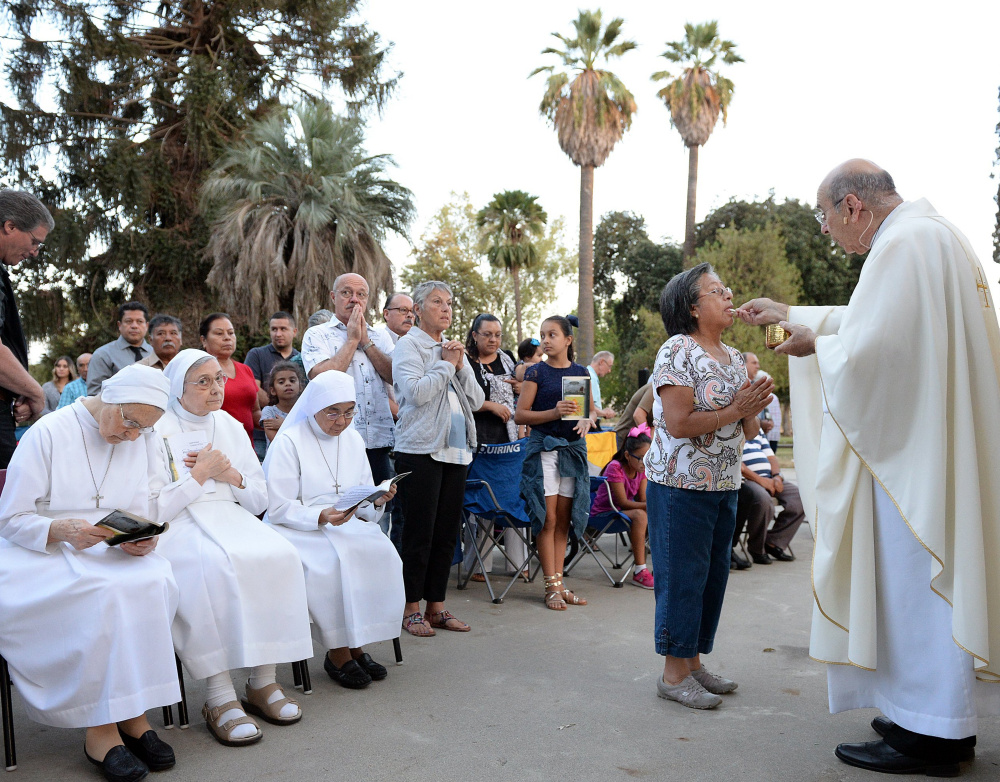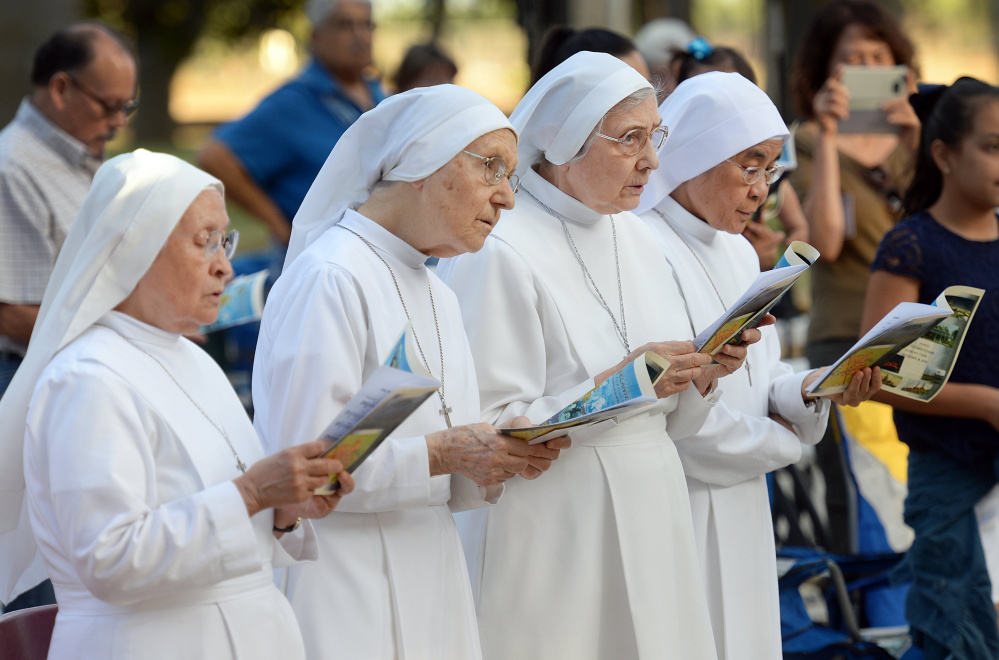VISALIA, Calif. — Bishop Armando Ochoa begins the Mass outside a building that resembles a large red barn. He carries a hooked staff covered in animal fur and wears moccasins and a leather sash – a tribute to the nearby Tule River Tribe.
The recent service among old oak trees in Visalia’s Mooney Grove Park was one of nine stops on a yearlong “mobile Mass” tour to rural communities in the Roman Catholic Diocese of Fresno.
The clothing and location are unusual for the bishop, who normally celebrates Mass in the large, ornate St. John’s Cathedral in downtown Fresno.
In Mooney Grove, he points out the beauty of a statue of a Native American warrior riding a horse and talks about how tribes in the central San Joaquin Valley have long considered the land here sacred – and that he does, too.
This gesture is a nice surprise for Johnny Luna, a Native American listening to the bishop’s homily.
“When he said that, I smiled,” Luna says.
He says it “felt good” to hear because Native American history is seldom discussed.
The mobile Masses highlight local history and struggles facing people who are “sometimes forgotten or hidden from view,” says Monsignor Raymond Dreiling, the diocesan vicar general.
It’s also a way for the diocese to celebrate its 50th anniversary by getting back to its missionary roots. Clergy once preached to rural communities via “chapel cars.”
Church leaders have revived that practice with a new mobile chapel – a retrofitted trailer pulled by a truck. The words “siempre adelante” painted on its side mean “always forward” – the motto of Saint Junípero Serra in the 1700s when he founded a string of Catholic missions in California.
The mobile chapel, unveiled in December, should be put to good use in a diocese that covers eight counties. It was taken earlier this year to Manzanar National Historic Site, the location of an internment camp for Japanese Americans during World War II.
Survivors of the camp attended the somber service. There were 200 Catholics interned there just because they had Japanese surnames, Ochoa says.
“We certainly shamefacedly have to pick up the pieces and say, ‘Never again,’ ” Ochoa says. “Never again should that happen.”
The church may not have directly caused that injustice or other dark chapters in history, but it still was part of a society that did, Dreiling says, and that’s important to acknowledge and to ask for forgiveness.
“There’s been a change of heart,” Dreiling says. “The church now stands very vocal and officially opposed to discrimination in all its forms.”
In that spirit, the Catholic Bishops of California issued a statement in September urging immigration reform for those enrolled in the Deferred Action for Childhood Arrivals (DACA) program and their families. Dreiling estimates about 70 percent of approximately 1.3 million registered Catholics in the Diocese of Fresno are Hispanic.
“DACA students are not the so-called ‘bad hombres,’ an insidious label used to instill fear in others and feed the racism and nativism that unfortunately is rearing its ugly head in our cities,” the statement reads. “Far from it, DACA-eligible youth are high school graduates, in school or working on their GED. Many are now in college. They may be honorably discharged members of the armed services.”
“People say, ‘Oh you bishops are involved in politics.’ This is not politics,” Ochoa says. “This is the doctrine of social justice that we’ll continue to proclaim.”
He says there’s a “mean spirit alive and well” in society today and unless people speak about Gospel values, others will not say anything about it.
The doctrine of social justice continued during a mobile Mass at Fresno’s Kearney Park on Sept. 19.
The bishop talked about how low-paid Chinese laborers called “coolies” helped to build the park and about how Latino farm workers contributed to the wealth of the area.
Dreiling’s homily is in line with direction from Pope Francis for the Catholic Church to “accompany” those who are suffering
Dreiling says breaking down “real or imagined barriers that enslave people again or hide them from view or shame them as worthless or having no dignity.”
Send questions/comments to the editors.




Success. Please wait for the page to reload. If the page does not reload within 5 seconds, please refresh the page.
Enter your email and password to access comments.
Hi, to comment on stories you must . This profile is in addition to your subscription and website login.
Already have a commenting profile? .
Invalid username/password.
Please check your email to confirm and complete your registration.
Only subscribers are eligible to post comments. Please subscribe or login first for digital access. Here’s why.
Use the form below to reset your password. When you've submitted your account email, we will send an email with a reset code.